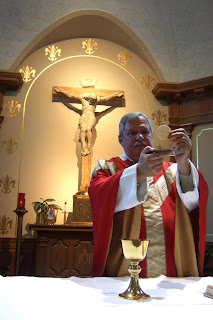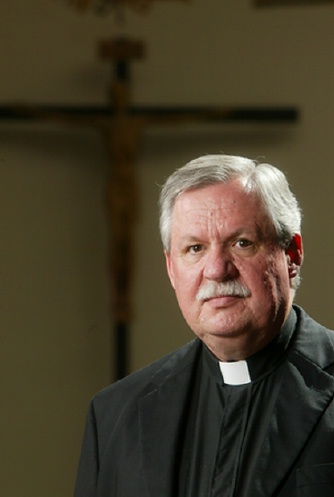
In the face of the temptation to run away, to give up on God and humanity, Jesus of Nazareth recommitted himself to the Father and the work the Father had given him to do. “Not my will, but yours be done” (Luke 22:42). “Not my personal, immediate, and individual preference, but your cosmic program of Building the Kingdom,” he readily acknowledges.
At this moment “an angel from heaven appeared to him and gave him strength” (Luke 22:43). The Greek word for angel – “angellos” – is also translated “messenger.” The Father sent a messenger to the Son to give him strength and courage to face the hatred, anger, envy and resentment of his religious opponents and the cowardice and corruption of the Roman officials.
Remember: The Risen Christ knows our sufferings. We walk where Jesus walked. In our times in the Garden, the Risen Christ sends us angels, messengers from himself to strengthen us.
In the Penitential Rite at the beginning of mass the priest says, “Lord Jesus, you give us yourself to heal us and bring us strength. Lord, have mercy!” We all respond, “Lord, have mercy!” And so the Lord does have mercy on us - in the concrete events of our lives and in the Eucharist.
St Teresa of Avila understood that God had asked her to create new, reformed Carmelite houses of her day. Her taking on this work generated intense opposition.
“Sometimes it seemed that everything was going wrong. This was particularly so one day, before the arrival of the Provincial, when the Prioress ordered me to have no more to do with (the new convent) and to give it up altogether. I went to God and said, ‘Lord, this (new convent) is not mine; it has been founded for Thee; and now there will be no one to carry on the negotiations, so Thy Majesty must do so.’ This calmed me and left me as free from worry as if I had had the whole world carrying on the negotiations of me. From that moment I left quite sure (it) would prosper.”
From The Autobiography of Teresa of Avila.
In her distress St Teresa remained committed to the work the Lord had given her, but asked for his help in carrying it on and consoling her in her distress. And the Lord clearly did so.
We live Christ’s Eucharist in our daily lives as we see him act on our behalf and as we feel him giving us strength and courage to face the difficulties and challenges of our lives.

No comments:
Post a Comment